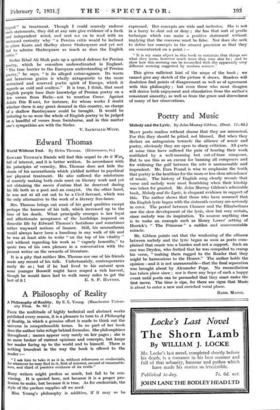A Philosophy of Reality
FROM the multitude of highly technical and abstract works published every season, it is a pleasure to turn to A Philosophy of Reality, in which a genuine effort is made to think out the
universe in comprehensible terms. In no part of her book does the author take refuge behind formulas. She philosophizes throughout ; names appear very rarely on her pages ; she is no mere broker of current opinions and concepts, but keeps her reader facing up to the world and to himself. There is nothing truculent in the way the book is offered to the reader :— " I ask him to take it as it is, without references or credentials, for whatever he may find in it, first of interest, second of reasonable- ness, and third of positive evidence of its truth."
Many writers might profess as much, but fail to be con- vincing. It is quoted here, not because it is a proper pro- fession to make, but because it is true. As for credentials, the style of the preface supplies all we need.
Miss Young's philosophy is additive, if it may so be expressed. Her concepts are wide and inclusive. She is not in a hurry to shut out or deny ; she has that sort of gentle technique which can make a positive statement without implying that the converse must be false. Nor does she seek to define her concepts to the utmost precision so that they are concentrated on a point :— " It is my main object in this book to maintain that things are what they seem, however much more they may also be ; and to show how this seeming can be reconciled with the apparently very different seeming suggested by modern science."
This gives sufficient hint of the scope of the book ; we cannot give any sketch of the picture it draws. Readers will doubtless find points of disagreement as well as of agreement with this philosophy ; but even those who most disagree will derive both enjoyment and stimulation from the author's consistent sincerity, as well as from the grace and shrewdness of many of her observations.










































 Previous page
Previous page